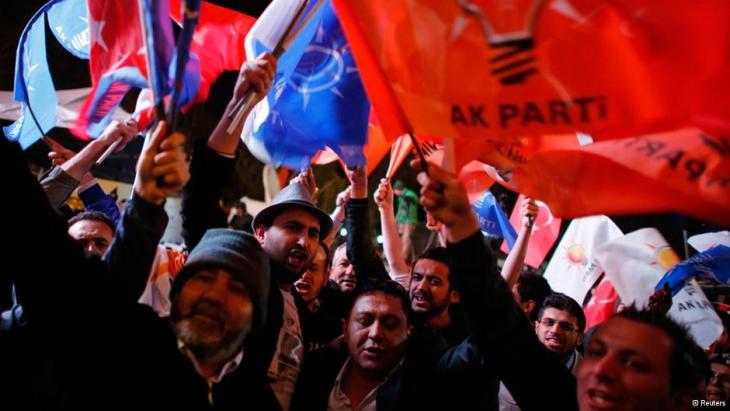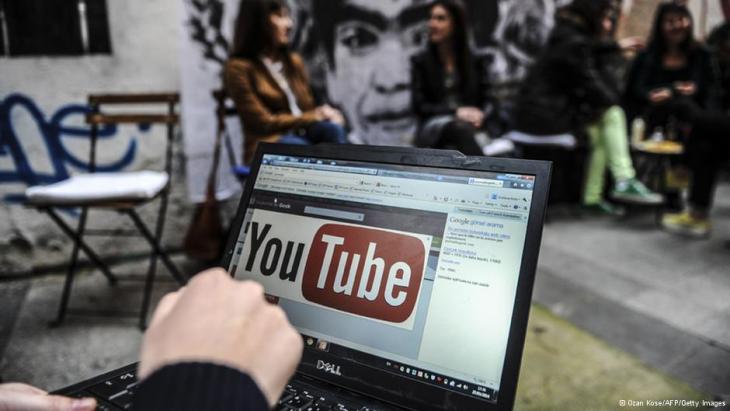Carte blanche for a crackdown

It's almost 10pm on Sunday when Turkish Prime Minister Recep Tayyip Erdogan takes to the stage in front of the AKP headquarters in Ankara. Just as in the years 2007 and 2011, after the party's victory in the parliamentary election, he is to hold what has become known as a "balcony speech". Back then, he stressed his intention to fill in the trenches that had been dug during the election campaign; in 2011, he ended the address with the words "I embrace 74 million".
Following the poll on 30 March 2014, which was also primarily a referendum on his policies, the tone was quite different: "I've been saying this for months. We will run them down. We won't deliver this nation to Pennsylvania or its treacherous offshoots." By Pennsylvania he meant the Gulen Movement, where its leader, Fethullah Gulen, lives in self-imposed exile. It was a declaration of war. And it is a bad omen for the coming weeks and months.
Just under 53 million voters elected almost 1,400 mayors last Sunday. With a share of 44 per cent of the vote and victory in more than 600 constituencies, the ruling AKP secured a better result than in the 2009 local elections (38.5 per cent), but a worse result than in the 2011 parliamentary poll (49.5 per cent). The parliamentary opposition parties CHP (just under 29 per cent), MHP (16 per cent) and BDP (5 per cent) came in second to fourth respectively.

Economic factors
Two factors were responsible for these slight fluctuations. On the one hand, economically speaking, the average citizen continues to do relatively well. Some people may be in debt, but they are not overly worried about it. Even though economic experts are predicting stormy times ahead for the Turkish economy because direct investment has declined significantly as a result of government interference in the justice system, many are not yet feeling the pinch.
Secondly, after 12 years in power, the AKP controls the majority of the nation's media, either directly (as in the case of the state television broadcaster, TRT), indirectly via its allied business holdings (Sabah, Yeni Safak, Star, ATV, NTV) or it has intimidated companies by imposing tax penalties, as in the case of the Dogan media group.
For this reason, Turkish people – particularly those living outside the big cities – either hear nothing at all about the corruption scandals and leaked recordings on the Internet, or only perceive them as election bluster because the stories are presented by the opposition. What's more, the AKP's public relations machine has succeeded, from the Gezi protests right up to the present day, in portraying the opposition and Erdogan's opponents in society as immoral and a threat to the public.
Settling scores with political opponents
These tags were applied to the urban, leftist-secular Gezi protesters who have been accused of drinking alcohol in mosques and harassing women wearing traditional head coverings. Even if this is quite simply untrue, most people believe it. This appears to be exactly the same tactic applied to the Gulen Movement, which Erdogan holds responsible for both the exposure of the corruption scandals and the publication of embarrassing recordings of telephone calls and conversations.
Erdogan issued an angry response to these publications at almost every election rally, accusing the Gulenists of setting up of a dangerous parallel state or bluntly referring to them as perverse. During his balcony speech in Ankara he said, "unethical politics has lost today. The politics of cassettes, of montage, of slander and mudslinging."

Erdogan sought this confrontation ahead of the elections as a way of showing that he can win elections even without support from the Gulen camp, and he succeeded. These elections have shown that the network of Fethullah Gulen, who has been living in Pennsylvania since 1999, a network described as secretive and extremely powerful, is by no means a crucial factor influencing the outcome of elections. It is perhaps responsible for the three per cent that defected from the AKP to the MHP.
For Erdogan, the election results give him carte blanche to continue his hard-line political approach. A wave of arrests against Gulen supporters in the media and civil society can now be expected. It is also more than likely that action will be taken against the large concerns that are organised within the TUSKON union of employers. The first tax audits at Kaynak Holding, which is described as the "coffers" of the movement, already got underway last week.
Increasing polarisation
The parliamentary opposition remained at the level it has been at for the past decade. The Kemalist CHP defended Izmir, Thrace and most of the coastal provinces, but continues to be virtually non-existent in the Kurdish provinces (with less than one per cent in Diyarbakir and Van!).
The Kurdish BDP also defended its strongholds in Diyarbakir and Hakkari, was able to add Mardin to its list of triumphs, but failed dismally in Sanliurfa with the popular Osman Baydemir. If any party can regard itself as a winner, then it is the radical right-wing MHP, which made nationwide gains and won cities such as Manisa, Adana and Mersin. None of the parties managed to tap into new seams of the electorate.
This election result does not augur well for the country's democratic development. The fear is that the political climate will become more authoritarian, more polarised and more frosty. The division of Turkey into pro-AKP and contra-AKP camps continues apace, although neither side is likely to push for more democracy.
Ekrem Guezeldere
© Qantara.de 2014
Translated from the German by Nina Coon
Editor: Aingeal Flanagan/Qantara.de
